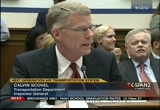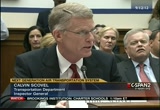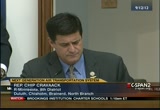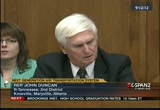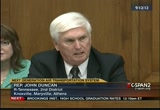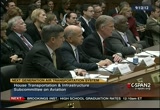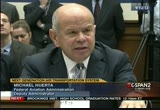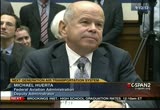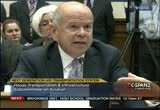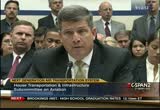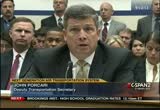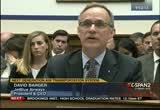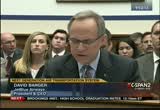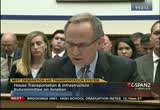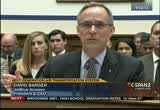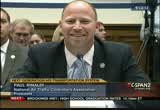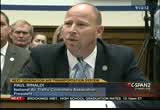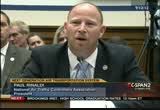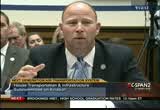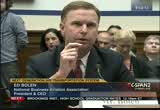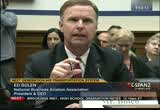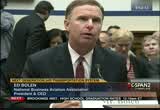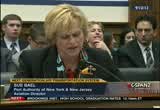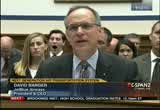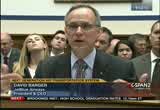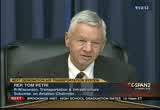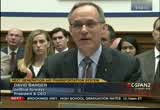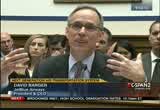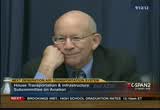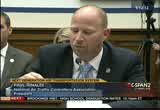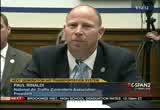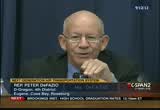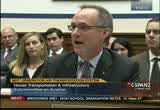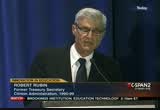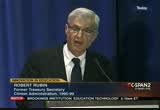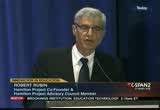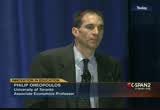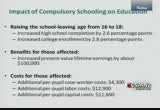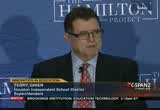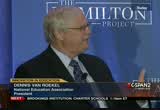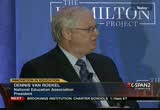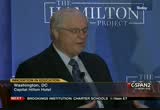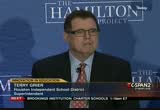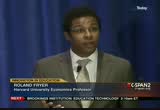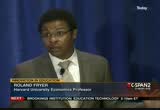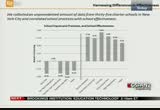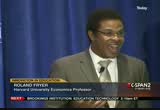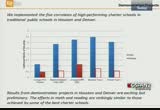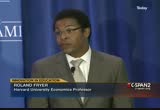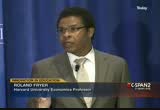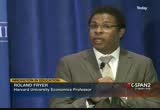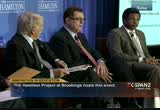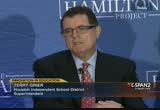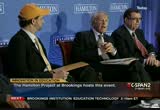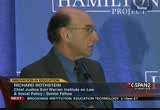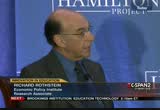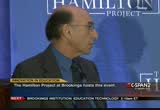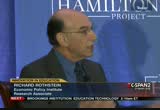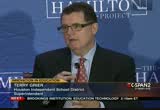tv Capital News Today CSPAN September 27, 2012 11:00pm-2:00am EDT
11:00 pm
and so forth and that is the key aspect i would seek to reinforce is faa should respond to industry's demands, the user's request for a focus on the most advanced levels and procedures possible. our data indicates the mainline carrier or aircraft are equipped -- 49% are approved to fight them. in order to divide the most benefit from advanced procedures, which would be for sites present approach is, it needs to be in place. today, the first set of procedures solution indicates 136 solutions produced by faa, but only three incorporated advanced procedures but does curved approaches. so there is a disconnect between
11:01 pm
what faa is capable or willing at this point to produce and that the most advanced segment of the airline carrier industry were to like to see happening. so there is the difference between what is expected are requested and what can be delivered. >> to think this is a good return on our investment? >> absolutely. come the promised land. when we all get to jerusalem and nextgen is in place will be an excellent return on investment. >> amen. sounds good. i'm a little bit more of a touchy subject, recently on may 23rd, 2012 that a staff meeting, a gentleman by the name of mr. hinckley, the administrator for aviation safety made what i thought were some inappropriate comments. if republicans win office, jobs may be affected. if democrats win office, their
11:02 pm
jobs would not be affected. i think these comments are extremely inappropriate and i would like to know where these comments are coming from if this is an independent speaking. is it coming from the administration or from the white house? where is this man speaking from? >> is certainly not coming from the administration or white house. i take any potential violation extremely seriously. we do understand the office of special counsel has opened up investigations into this particular instance that we are cooperating fully and not. >> good enough for me. i yield back. >> thank you. mr. duncan. >> well, thank you, mr. chaiman. this will be some of the same frustration that chairman mica and mr. defazio expressed, but i read in the report the headlines, unresolved problems
11:03 pm
continue to impact the cost and pays and then it's below that, software related problems have cost overruns and schedule delays and in the staff memo, they have $640 million that was meant for other programs. i suppose i've been to every hearing but never had from the very start and i've been to a couple of facilities to learn what this is all about and how it operates and i don't understand all of this, but i said maybe the first or early hearings on this that i guess i either native state interest a question for some future aviation subcommittee who
11:04 pm
commented here about delays and cost overruns because that is that everybody sort of expected would happen. sure enough it is happening. not just on eram, but other things as well. what i am wondering about, since it is similar to a question i asked her statement he made years ago, are we going to have a meeting of the aviation said committee six or eight years from now and here about additional delays and cost overruns and i understand i have been told over the years that when it comes to august technology, that everything is obsolete the day they take it out of the box and i know there's always additional bells and whistles that people want. but i will ask all of you, do
11:05 pm
you feel that we are doing everything that could eat on? are there any additional things that could be done to see that we don't have additional cost overruns before this is fully implemented in 2028 or whenever. >> mr. porcari. >> thank you, mr. duncan. it is a fair question we take very seriously in the sense that we have looked at the lessons learned and if you take eram is one example of would've been structured differently. in hindsight we would've brought in our workforce to help us develop it and that was, in my opinion, a large part of the problem. we if anything would have greater interactions from the beginning with industry and users and we have a very collaborative effort that
11:06 pm
mr. huerta has described to you. it is picked some of the early procedural implementation parts of it, where we determine what and where is operationally implemented for benefit. it is i think not possible to say they will never be any problems going forward with this, but i will tell you it's a much greater level of confidence as the department's largest infrastructure program to send and i have been very personally involved and. i've a much greater level of confidence and where we're headed in the trajectory we are on now in a couple of years ago and in part i would credit acting administrator huerta's personal involvement and continuing effective administrator. >> anybody else?
11:07 pm
>> when i joined the agency a little over two years ago, my background was program management, large complex technology deployment and one of the things i wanted to focus on coming u.s. about eram. what i saw was a deployment that us encounter problems. the problems we had were we were starting deployment in my facilities, running into operational difficulties, things that are significant challenges that we needed to work through. but we did at that time is but a couple of things in place. one was a diagnosis of always the problem. we broadened the parties to look at it and we determined that what we widen hot early enough in the program was the human interaction that people will have to operate this program involved in its development and to really understand how this is going to work in a real-world environment. as a result of evaluating this
11:08 pm
program and everything of that with a comet that was what was behind putting the management changes be put in place, establishing a centralized program management organization that will bring best practices and program management to ensure we can hit deadlines, milestones and budgets. that is why we elevated and expanded responsibilities of other nextgen organization to ensure we have appropriate system integration, that we take account how one project affects other projects in so forth. what we wanted to do was make sure we were using us back to says that are used in any business for managing a large complex undertaking of this sort. it was in june of 2011 we read based the program. at that time we said that project was going to be three years in eight months behind schedule because of problems i told you about and that is going
11:09 pm
to cost $330 million more. today it is still exactly where we are. we have hit the milestones that we put in place at that point and i think that we have turned the corner on that program. i certainly wish we had never gotten ourselves into this situation, but i think we are well on our way. >> let me just say this, but it's frustrating is years ago when all this was started, i think if when it was brought up, i think everybody probably expected there'd be cost overruns and delays. i doubt there's anybody in the string that is shocked or surprised there have been over and send ablaze. or that there will be in the future. let me ask you this, how much have we spent? eram is not the whole program. how much has been spent on the whole program so far and how
11:10 pm
much is going to be spent before it's fully implemented quite i am wondering if anyone can answer that question. i guess it is almost an impossible question. i know this is a difficult thing and everything looks easy from a distance, but i also know we have an obligation to try and stay on top of it. >> we have been spending at a rate of a billion dollars per year. >> i'm sorry, i didn't hear what she said. >> we've spent investment with the support of this congress and eram and wheat and the federal investment over his program was planned at 822 mike $27 billion expenditure. now that does not include >> 27 billion >> that does not include what in nature invests in equipping
11:11 pm
aircraft and everything associated with that. from my standpoint, we are managing this program is a series of building blocks. basic foundational type elegies that we have faced in our operating within their baseline. but we do is we have adopted an approach premised upon this program perches that is a risk mitigation strategy where we make incremental investments come and match up with an essay so we can ensure that it makes sense to continue making those investment. in a program of this nature, where investments are being made over an extended period of time in a very dynamic industry that is going through some changes, details of the uncertainties such cost of fuel and where is the market going in everything that affects that. we believe that is the most prudent approach to ensure the best stewardship of the federal
11:12 pm
taxpayer investment. >> i apologize i ran over my time, but this is all very, very interesting to me. i remember many years ago they had via graphical sketches evolved members of congress at the department of transportation and at the bottom under each day had question specifically asked another most they didn't have questions, but underminded said, how much will it cost? i didn't realize i was so transparent i guess, but i have been concerned about that on this program and i still have those concerned. it's a fascinating thing, but also a lot of concern, too. thank you. >> next day probably have you taken a sharp pencil through the store? harry coppola. >> thank you, mr. chairman. i've been involved the
11:13 pm
simultaneous hearing between hearing judiciary, so i've had to play catch up. i apologize for my delayed arrival. good to have you all with us. mr. scovel, the proposed trip to jerusalem will not depart today? >> is certainly won't i regret to say. >> i wanted to go, but not today. mr. porcari, do you believe there are any stakeholders not fully committed to the proper implementation of nextgen? >> all stakeholders are committed and we have worked hard on stakeholder interaction and understanding their needs to make sure. so i blew stakeholders are implemented. >> so no naysayers. >> i do think there's appropriate skepticism from everyone involved that we get the proper benefits for the
11:14 pm
investment. >> supported. >> how well set three improve the product to video bear controllers and do you believe that nextgen has delivered and increase productivity? >> to answer the second question first, i do. >> can you pull that make a little closer to you? >> how is this? >> better. >> it has increase productivity, but more needs to be done and we will deliver more productivity benefits. the major benefits receipt, which we are really focused on this improved air traffic control procedures and you get the maximum productivity by focusing what you can do around airports. two dimensions to that. can you reduce track is flawed on arrival and departure? what d'agostino is reduced fuel
11:15 pm
burned, reduced emissions and costs. second aspect is something called dissent, which we are focused on pure traditional sense of airports are a lot like walking down the stairs. that is the aviation equivalent to stop and go driving in traffic, very field and efficient. but do not timaeus profile, reducing your fuel burned. all of that represents huge enhancements and productivity. so improving the way aircraft approach and a part gives you a lot more efficiency and a lot more ability to manage more aircraft in yesterday's base. the second benefit that gives you is the ability to what we call d. conflict airports. in large metropolitan areas, say dallas, fort worth, because of the nature of older type knowledge he and just the
11:16 pm
geography of where airports are located, we need to manage airports and construction with one another. controllers need to manage both in tandem. with advanced navigation procedures, we can separate airports because of current approaches that mr. scovel talked about. it has attracted a conflict, that greatly increases capacity of both airports. that is what we're trying to get out through the deployment of advanced navigation procedures and the benefits are quite real. >> good to have you with us. i yield back, mr. chairman. >> thank you. as long as you are here, mr. porcari, i wonder if he occurred comment on the status of sort of the international negotiations if that's the
11:17 pm
correct way of framing it in dealing with the european, and congress has been on record as criticizing an illegal omissions trading scheme and that they are trying to impose extraterritorial. can you comment on where that'll issue stance? >> i be happy to comment on it. first, we have serious legal and policy concerns with the proposed emissions trading game. it is extraterritorial. it is fundamentally unfair in its approach and we believe it is not the right way to do it. if you look at press events, using the international association organization for consensus building on international aviation issues is a much more effective way to do this. we have been clearer both on the
11:18 pm
record, author record and at every level with her e.u. counterparts, that this is unacceptable, that we do not support it. and i think if you are looking closely at the reaction around the world, you will see that we have a lot of other nations that in concert with the united states also believes that the unilateral imposition of the trading scheme is inappropriate. finally, there appears to be some recognition on the europeans died of late but there's a real consequence for doing this. so we will continue to press for the appropriate avenues for the resolution of an issue like this. we are continuing to make it clear that we have serious concerns and do not believe it should be implemented and i
11:19 pm
think the consequences of the european union moving ahead are much better understood ide these days. >> mr. chairman, thank you are just a few comments and i think it is worth noting. oftentimes we point out when there are mistakes made or cost overruns, but i just have to say that since i've been involved, i open in my remarks there was a time when the faa couldn't tell us what it was. it was not until secretary lahood was appointed secretary of transportation and randy babbitt, the former administrator came into office in the 50 acting administrator on board two years ago that there was stakeholder involvement. many of you heard me say from
11:20 pm
this feed that we heard dr. billingham, general scoble agreed that we needed to get stakeholders involved, but that logjam did not free up until secretary lahood and administrator babic came into office. and then we started involving stakeholders. we started talking about near-term benefits and we actually came up with the blueprint, which chairman mica mentioned. many of the things in the bill signed into law came from secretary lahood so it is worth noting that much progress has been made since that day. i remember he came to see me and he said, what are the challenges
11:21 pm
of deviation? i said you have to do two things then you have to do them quickly. one of the things is you have to free up this mentality that we do not want stakeholders involved that we don't want to hear from them. so to his credit and the credit of the former administrator, mr. babbitt and the acting administrator here today, we have made progress. we have a long way to go, but we've come a long way from a few years ago. so with that, mr. chairman, thank you. >> i must say currently the internal management competence in this sort of process, due in part to people here are the fad of work is a couple years ago. this is a different type of process and takes a different type of experience. we thank you for your testimony and the first panel is adjourned.
11:22 pm
we will turn to the second panel and as they are coming forward, let me introduce them. it consists of mr. david herscher of jetblue airlines. we know we have a number of important commitments and hard to between them and we appreciate his attendance at that hearing today in a sense that it may be his swan song that he is finishing that they distinguish. the public service as head of the nextgen advisory board and has been a major contribution for moving dead center or even slipping back in some areas to making real progress and i think it's to his credit that usually
11:23 pm
one good measure of how someone is doing is whether they are preparing someone to take their place and someone who is strong. you have another person of competence and experience in this area. i am impressed by the fact they hear from some of his associates that he was enough extra time in his schedule so that he can engage in helping on this process and turning some of his day-to-day responsibilities over to others at the alaska airways. so does that attribute to you in part and we thank you for that. others on the panel are paul rinaldi, air traffic controllers association has been before us before. thank you for being here again. it is true also of ed ed ed.
11:24 pm
and ms. sue bael, director of aviation port authority in new york and new jersey. welcome comment thank you for being here. we look forward to summarizing your prepared statements in about five minutes. >> thank you very much, mr. chairman, i appreciate the kind words as well. thank you two ranking member costello as well for his support ongoing and distinguished members of the subcommittee appeared on behalf of more than 14,000 members at jetblue, thank you for the opportunity to be here this morning to cert link discuss at this testimony. i would like to begin by thanking you for your genuine passion on this topic can educate all americans about the importance. i know is we've spent time over the years, we think about of course your home state and
11:25 pm
robust aviation community in the state of wisconsin and what happens over the course of the most spectacular week of the year at the oshkosh air show with bea. and with that said tamayo so juxtaposed my thoughts and comments regarding matches the home base of operation that i come from at new york's john f. kennedy airport, the congestion in the air space challenges have across places like the metropolitan area and here i am the metropolitan area. all of this site, mr. chairman and certainly two ranking member costello as well, and over the years, you have certainly been passionate about pursuing just real meaningful solutions to these problems as if they had been in your congressional districts across the country and we certainly appreciate that as an industry. your palate hearings, conduct of information on sessions and have
11:26 pm
an open door as he sought not to assign blame, but in terms of driving a shorter path to progress in the future. for the past years as chairman of the faa's nexgen advisory committee. i thank you and i'm wearing two hats today. that is in the rover chairman as well as ceo at jet airways. on the sub three advisory committee come all soon conclude my 2-year-old weary bruce group of leaders from across the world does both volunteered that. we provide consensus-based recommendations on complex policy issues and response to specific questions they present to us. now through the rtca has reported back to the task with recommendations for initial reports. on 17 items critical to implementation, ranging from
11:27 pm
select team and prioritizing metro plex plates, rollout within the sites to performance manager, incentives to the issue and the 17 items have been submitted in my written testimony. and now come as i have undertaken a graduate-level study course in all things nextgen over the past two years in my time i am excited to report it could not be more pleased with the progress of this group i chaired, including those in the support of my fellow panelists this morning and also with partners of the fas dimensioin your closing comment where work was so closely over the past two years of my chairmanship. my members are voting each and every meeting. we have held every aeronautical university in daytona beach. we been up in new york at kennedy airport and with mayor
11:28 pm
bloomberg at gracie mansion and even at the complex in seattle recently. and it just a couple of weeks, we will be hosted by department of defense at air force base. the thought here as to get out and see what is happening across aerospace, whether it's education or whether it's a different facets of aviation as we talk about these issues. it is engaged and committed and would certainly remiss if i didn't bank our set chair over the course of the past two years, tom hendrix who has since moved on and also steve brown for their tremendous work and literally hundreds of volunteers working on workgroups and task groups as early as with margaret chan and i'd like to also thank andy stabile of with his help over the years. not just as members are engaged in our work, we've been very pleased with the knowledge and level of engagement with
11:29 pm
administrator michael huerta, first as official while serving as a deputy administrator, michael has become even more, not less active in our work since been elevated to the role of acting administrator. the disinterest of working closely with the aviation community, i am confident in our ability to overcome barriers to implementing nextgen. you commented about succession planning and i am pleased with my chairmanship sunset and i will remain on the committee, bill ayer, chairman of the alaska air group, bill has been formally leading the group as chairman and ceo, who is an experienced aviator will be taken over the chairmanship on a go forward basis as we pass the baton at the air force base here in october. and if i may, the greater skies initiative was eliminated upon by both the deputy secretary and
11:30 pm
the acting administrator of just tremendous success stories and though i won't go into details about that, this collaboration, and does work with alaska airlines, with the faa over several years, moving tracks over water, reducing milestone, optimizing profiles and altering air traffic control procedures all enhance the navigational performance while alaska airlines, the largest carrier in seattle, what with others or reducing fuel and emissions today, reducing noise exposure in the community and alaska expects to save over 2 million gallons of fuel and only as a result of this collaborative effort. this is happening today in the seattle metroplex. mr. chairman, success taking place is as much about the tech illogical improvements as it is about surmounting the non-technical barriers to employment in nexgen. i'm expecting from the faa to an
11:31 pm
actor in a chairmanship will be to explore non-technical barriers and i look forward to effectively cutting through these bears in the future. a couple closing thoughts. as i just put on my jetblue have for today, first of all jetblue operates primarily in the congested northeast airspace with our two biggest focus cities being that of new york's kennedy airport, the largest airline and also boston logan airport over the largest carrier. ..
11:32 pm
>> deed utilizing constant vertical descent with a content clear flightpath. shorter lifetimes as well as reduced yule burning omissions and cleaner skies initiative in seattle. i think that in my closing thoughts, very good progress has taken place on behalf of our airlines. as i put my hat on. i think that i would be remiss
11:33 pm
if i did not comment that we are a little bit disappointed that a the procedure that was put into place and laguardia will work towards a solution to benefit us in the new york metroplex. all that said, i am very pleased about the partnership that is taking place. in closing, nextgen is a vital part of the aviation industry. nextgen will reduce waste and improve the environment. it will also improve efficiency and safety and add jobs and strengthen the economy. the case for nextgen has been and continues to be compelling. i would like to thank you, mr. chairman, the ranking member and the distinguished members of the committee for hosting the panel today. i look forward to any questions you might have. thank you again, serve. >> thank you. mr. reynold. >> thank you, mr. chairman.
11:34 pm
>> nextgen is a catchall phrase that means everything to everybody in the aviation community. i am proud to be involved as an essential stakeholder in nextgen development and fully participate in the advisory committee in which was just spoken of. the nextgen advisory committee has been an outstanding job of simplifying of what nextgen really is. using satellite approaches using this technology to reduce voice communications for voice restoration or frequencies. that is what nextgen is as we move forward as a short-term in the near term. we have heard a lot about the equipment and the ram.
11:35 pm
collaboration is key for anything the work and life. but in 2009 when randy babbitt took over, and one the secretary ray lahood was concerned, we were not involved in it at all. at that time, it was over budget and was not supporting any facilities around the country. it was in january 2010 where we actually started to get involved and that it was unacceptable and unsafe to run an air traffic control facilities. through hard work and collaboration, through the passion of our control of being involved, we are proud to say hopefully we need to note that
11:36 pm
in 2003, in 2009 it wasn't even close to being finished. in two short years, we have brought it to buy facilities and we are working hard and very importantly, we are working to get eram involved in the next jan discussion. here is why, which we talk about the satellite navigation and datacom which we talk about communications between controllers, transport, which is a necessity, none of that works must eram is a supporter.
11:37 pm
we have to open some out and mae sure that is deployed properly. her representatives are very proud of what they have done. the collaboration started with developing, testing, training, and implementing. while we are changing the technology, it is like changing a tire on a car that is running down the highway to 5 miles per hour. we are still moving 100% of the airplane and changing technology at the same time. as we implement, we need to take these tests and understand how we are getting there. we understand how eram became a complete failure and is over budget. stakeholders were not involved. now that they are involved, we
11:38 pm
are seeing this. as we move forward, and i have heard a lot of discussions about this on nextgen, we cannot forget how we got through success of eram to every program in nextgen. but you need real stakeholder involvement, so that when we deploy, we train and we test and we develop and are involved on the front end so we save money. one of the things i wanted to talk to you about his recently, we talked to one of the eram program, we stumbled across a monitor program. it flickered and it is a huge distraction and for anyone who has seen a radar scope, you can look at at it like that for long time and it is flickering. i know that doesn't seem like a lot when we talk about $27 billion, but we are involved early, as we were before, that
11:39 pm
is how we can save money. i do want to thank you for holding this hearing. i urge you to hold more hearings so that we can continue to keep the focus on nextgen and important programs. >> thank you, mr. bowles. in my capacity of a vice-chairman of rt ca, you are very familiar with that organization. i would like to use my time here to pick up on that theme that i think congressman costello articulated so well. mr. rinaldi said when we started on this, it meant everything to everyone. which is another way of saying
11:40 pm
that meant nothing to everyone. everything is a priority, nothing. but where we are today, if you mean the same thing. that is pretty important accomplishment. well have talked about how important and we are doing now because we believe that nextgen can give us essential capacity increases. that will reduce the risk. we are doing it because we believe that nextgen, by providing more direct routing can reduce our environmental footprint. so we are embarking on this for
11:41 pm
some very specific benefits. we are laying out a path and laying out a vision for where we want to go in over the course of the next several years, rtca has been taking tasks from the faa and beginning to figure out how we actually move forward very clearly. that movement forward is not without its challenges. we are learning that nextgen is not just about technology. clearly, eram is a part of it, tran-sixes a part of it and is s.w.i.m. it all has to fit together if we are going to move forward.
11:42 pm
we are beginning to take philosophical approaches to issues, such as deciding that it's not a big bang one-size-fits-all. but a more measured metroplex approach the looks that looks at the unique attributes of the community. i think a lot of the progress that we have made so far is directly attributable to this subcommittee, the leadership that you have provided and the accountability you have demanded that i also want to say that i think a lot of the progress is a result of the tremendous leadership that dave burger and others have been able to provide. they have brought together a diverse industry stakeholders that you have demanded. we have the military involved. we have general aviation involved. we have airports involved. we have the airlines involved. we even have community representatives and we are all trying to move forward, because we understand that we are all going to benefit.
11:43 pm
the question was asked earlier do all the stakeholders supported. and i can speak for the broader general aviation community. we do support it. the reality is that the system that we have in the united states, just like everywhere else was built largely to accommodate the needs of the commercial airlines. and that is entirely appropriate. generally the aviation because participates in us. what we have seen is their space becomes congested or airports become congested, general aviation is pushed out a little bit. i remember when midway airport was a great airport. for san jose or manchester. you see how that begins to evolve. we want to make sure that we will withstand that capacity, enhance the safety, realize the environmental benefit. i think we are moving forward today. we have a lot of challenges
11:44 pm
ahead and we can see that the pavement, we have an opportunity to move forward, and i want to thank you for the leadership and the accountability that has been demanded by the subcommittee because the benefit has been very tangible. >> thank you, ranking member and the chairman. thank you members of the committee. i'm the director of aviation in new york and new jersey. we are responsible for the busiest new airports in the country. dedicated solely to this. together, these airports serve more than 107 million annual passengers, that is about 20% of all u.s. flights who operate through our airport. let me begin by applauding the members of this community for delivering a four year eight and
11:45 pm
10 faa authorization bill. i appreciate how you included a strict timeline that will help us analyze the delivery and benefits of nextgen. i also have to thank the acting administrator who is our designated federal officer. the other was dave, who has been positively brilliant. he has provided careful guidance on how to move forward. i am very proud to be known as a member of that committee. i was also honored to be part of ray lahood's advisory committee where nextgen was a fundamental element of nearly every conversation we have had, and no matter what the subcommittee and a prevailing theme throughout all of the committee recommendations. i should be clear. i never really intended to learn this much about nextgen.
11:46 pm
but in many ways, i just had to. with experts like paul rinaldi and others, i am not an expert. but no i know more than i want to about the subject. it is no secret that our airports are ranked at or near the bottom. one in three u.s. flights are affected by delays in the new york, new jersey and other ground delays occur in new york. that means that right now, about half of all flights in the country being held every day are on the tarmac and can trade their delays to one of the delays in the new york and new jersey region. delays and capacity constraint have stifled growth and a pair putting no vacancy sign on jfk and la guardia. the economist have calculated
11:47 pm
that for every million potential additional passengers whom we cannot serve, there are 5000 jobs that do not get created in our region. the delays are not just in new england. they cost money. and they have real economic consequences. extra fuel, a new flight school, hotel vouchers, business deals not done, extra meals in the airport and so on and so forth. in 2010, a university of california at berkeley study found that by delays across the united states cost $32.9 billion per year. most unsettling of all are the air passengers there that are the largest burden. it is a threat to the global competitiveness. we must rely on what is fundamentally used in the 1940s. we cannot. we must act quickly to fix this
11:48 pm
problem because the cost is simply too great. nextgen is the fundamental backbone of our solution. not the only part of the solution, but it is the backbone. not to be selfish, but i am told that my airports are responsible for 50% of the problem and i really think that nextgen needs to be implemented as soon as possible where can deliver the greatest benefit to the country. i am realistic. i totally understand the revamping and how it can't happen overnight. however, by attacking the problem, we can deliver improvements to constituents throughout the country, from marine base at tampa bay from portland oregon to portland maine and all of the ports in between. according to the 2010 gal report, are three airports along with a banana, o'hare, in san francisco, account for 80% of all the departure delays across the entire country.
11:49 pm
recognizing that our problem is truly in the issue of national urgency, the national alliance was established to advanced nextgen. a coalition of groups and organizations devoted to getting out the information about nextgen. last month we reached 1000 members. the thousandth member was the chicagoland chamber of comments in all, we have members from all 50 states and washington dc, sherwin industries from wisconsin and organizations like the los angeles chamber of commerce in california,
11:50 pm
st. louis business travelers association and hundreds more. together, these organizations represent tens of millions of u.s. air travelers. we have already begun piecing together elements of nextgen on the ground and it has helped to meter departures and minimize delays. we have done that and delays with our friend of the faa and the airlines using jfk and in a collaborative effort, we have been very successful. we are working to expand the program to la guardia airport. the system has saved nearly 5 million gallons of fuel and on the number of $15,000 annually. we have invested more than a
11:51 pm
billion dollars to make airport operations more efficient. our initiative has delivered. we have invested in building high-speed taxiway exits, minimizing runway time and enabling a more efficient procedure. the bottom line is that tens of thousands of delays have been averted. we recently launched a single phone number that pulls together all of our airports hotline, together with a website that expresses concerns. this new system provides feedback in real time is a standardized depository and offers to analyze complaints better than we have in the past. as we have before, all of this
11:52 pm
is well and good, except that admittedly, these efforts are not making improvement at the margin. it doesn't mean that we're going to stop. nor will i stop advocating for the implementation of nexgen. members of congress, but we cannot afford for this not to happen. not in this economy. not in any economy, frankly. in a time of tight budgets and other fiscal restrictions, it will prove challenging. but do we continue to mount the road and trent rising challenges as we are stuck with a world war ii radar-based air traffic control system? >> with so much at stake, i urge members to implement nextgen technology. we stand ready, willing and able to assist in new york and new jersey. thank you.
11:53 pm
>> thank you. thank you all for your testimony. mr. burger, you have the opportunity to spend a couple of years immersing yourself in some of the issues involved in pieces of the problem and i think you have looked at it from her point of view of your own organization and the opportunities and challenges. i don't know that -- i would be remiss if i didn't ask if you have any ideas or suggestions or feelings about how the process is going and how it can be speeded up, people in the industry have been burned one or two times, it has been on-again and off-again.
11:54 pm
how can this process be better with policy and procedures as well as technology. how can we help encourage positive leadership to help move this thing forward faster so it affords the opportunities and how specific you know, something specific investment opportunities new flight plans and all the rest. could you discuss that and how we can move this forward. >> sure. thank you so much, chairman. i tend to be a cadence person. when i think about these past two years and bill is now moving
11:55 pm
into the chair role, by the way this is working on behalf of the very good work of organizations like task force five, collaborating with the faa. ensuring that come in the opportunity for industry stakeholders to have a seat at the table and respond to these requests with the faa, which are complex, it is different than new york. north texas is different than atlanta. but the ability to talk about these complex issues and respond, i think first and foremost, i keep the committee in place with the cave-ins put in place for federal advisory meetings with the faa. number two, the task that have come across so far from the faa, such as equipment incentives, metroplex further definition, a rollout work prioritization, performance metrics, by the way,
11:56 pm
what are the metrics? is it fuel-burning? defining what these metrics are, the use of datacom business when all the talked about, the use of technology. driving efficiency. i am very excited about talking about these non-technical barriers. i think they cave-ins, we have 28 members, including the leader of the impact over in europe, including the director general of euro control, including stakeholders here in the united states. it is harmonization that is so important. i would just close, chairman, by saying that the benefits of these policies and procedures and the equipment and everybody being on the same page, when you look at the return on capital's of is a business, and i will talk about the airline portion, 40% of jeb -- jetblue is fuel.
11:57 pm
the return investment is obvious. the business case to the board room is obvious. my sense is that that is what we have to continue to be. last but not least, as mr. rinaldi said, we are all using the same language, the definition of what it is. because we were not, even as an airline, let alone the rest of the industry, defining the nextgen industry. thank you, sir. >> it is understandable with the government, in terms of the rules and fair and equal for everyone. then there is the tendency for the top down and the rules where you could get in trouble or whatever.
11:58 pm
in this case, it strikes me that you need to get the incentives right and give people to have some kind of to participate or move forward and have enough flexibility to accommodate today. if we get the basics of technology out there, at an airport, say dallas-fort worth, were to go get its procedures in place to be in nexgen airport, presumably, it would be it would be competitive. when ticket prices likely be less? would they compete with a win lan or say someone else, and why not figure out it will make us
11:59 pm
more competitive. could you comment on that? >> yes, chairman, i think two further thoughts. one is the theme of best capable and best served. other members, including mr. rinaldi may have comments regarding first-come, first-served. not unlike an hov line if you think about access to moving on a congested highway. when you look at this concept, which is one of these non-technical barriers that implement nextgen, best capable, best served, there is terminology for it, my sense is
12:00 am
that the incentives are going to be obvious and the two partnerships, the approach into kennedy airport d pioneering offshore from the northeast down, for us to save six minutes and route each way, on an airplane that burned 750 gallons per hour, times $3 and whatever it is per gallon, let alone giving the airplane back earlier,, the incentive is obvious. one other thought. i think of the success of the greater size initiative in seattle. many years worth of work. alaska airlines, the faa, many different components, the port of seattle, working to really harmonize and all that type of operations that were happening in that airport. you want to be careful about this advantage in. because there is mixed equipage. i does have a couple of thoughts
12:01 am
there. the issue is best capable and best served, that is -- it seems so obvious. it really does. >> mr. defazio? >> oh, thank you, mr. chairman. i was pleased to hear from this panel that we have seemed to make so much progress from some of the earlier efforts. i would just like to know that it is relating to the planning for tran-seven and reports by gm the other is about not having yet set parameters for a number of the major programs. secondly, revisiting what changed so much. i guess i go to mr. rinaldi burst with the eram program. what was the ginger. it was described as much more typical of my experience with
12:03 am
that was shutting the program done in many cases. the reason that is happening is that you didn't have a real, live testing going on with air traffic controllers. they had engineers doing it. once we had air traffic controllers involved, we had to rewrite a bunch of code. it was a lot. to change the direction we find another problem. we are not implementing it and so that problem continues. or we have a workaround, such as don't touch the abc key and then hit.
12:04 am
regardless of who is in charge of this committee or who the faa administrator is, congress has seen how we have success. we want the latest technology and to be very successful because we want the best aviation system in the world. is this piece of equipment making it safer and more efficient in making everybody's job better? >> is from your experience chairing the committee, do you think we have seen a systemic change in the relationship with
12:05 am
stakeholders, not just air traffic controllers, but all of the stakeholders, because in the past, as mr. rinaldi said, there was a procurement, they got engineers involved, they started sending change orders, and yet there was no relationship going on over here, that people would actually have to implement or buy the equipment and actually operate, you know, the system itself. >> congressmen, i have, but again, my visibility is from two years back. obviously looking forward on the committee. what i have learned with all the work that was done before, longer term, shorter term, in and day out. i think the comments by the chair as well as the ranking member regarding the acting administrator, michael lolita has been 100% focused, in place, president, whether it is his
12:06 am
deputy administrator or the acting administrator. randy babbitt before that, and then people like vicki cox, david gristle, and a significant member of the faa leaders, but i think what is really interesting, congressman is that here in washington or in a hangar in new york, people are truly, they are truly present. whether you are an equipment provider or building airplanes were operating airplanes, whatever that may be, whether it is corporate or general aviation or military airlines, european, usa, i think that that collaboration speaks volumes to stakeholders being engaged. i would say it's a very healthy thing. you know when you have something that's not healthy. you absolutely know that.
12:07 am
>> i agree with exactly what has been said. what has changed is that everyone is in the room. we are collaborating and we sense that at the top of the faa, there is a commitment. and i think that that has led us all to believe that this is possible and we can do it. i do not want to underestimate the challenges that remain ahead. you know, dave barger mentioned best capable, best served. we want to make sure that as we go forward, no one misinterprets our commitment to best capable, best served, as not capable and not served. one of the reasons we were enthusiastic about what we have saw greener skies initiative in seattle, is that those who invested in the nextgen equipment were able to receive shorter approaches and save fuel.
12:08 am
the military comment general aviation and others that can't be equipped. we have to find a way to do that. i think we are beginning to see the pathway. there is this clear vision on how we get there. we need to make sure that the policies and procedures support that. i do want to make sure that we understand that giving nextgen a right is not giving the technologies out there, but getting the benefits to be received. it is not enough to have eram absb and s.w.i.m. we have to have reduced environmental footprints. and that is going to be a challenge. we are talking about the quidditch. are you going to invest in technology and put it on your linkedinmac only if i truly believe the benefits are there. i would urge this committee to
12:09 am
stay very focused as we move forward on whether or not we are realizing benefits and not just deploying technologies. >> excellent. thank you. >> thank you, mr. costello. >> sir, i don't have any questions. it is probably a good time to racketeering up based upon what mr. bowling just said. he is exactly right. the responsibility of the subcommittee, and i know that you will take the challenge on to make certain that the benefits are there and that we are monitoring this as we go forward. i just want to thank the witnesses, not only for their testimony here today, before your service on the committee, and in particular, you, sir, time for you to not only get engaged and involved, but for your difference in bringing us to bring us where we are today.
12:10 am
12:11 am
in the u.s. it is part of the cybersecurity summit we are covering. hosted by the national journal and government executive media group. live coverage begins at 8:00 a.m. eastern here on c-span. >> to foster work and enterprise in the middle east and other developmental countries, working with the private sector, the program will identify the barriers to investment and trade. they will receive assistance packages developing the law, property rights. >> we believe that freedom and self-determination are not unique to one culture. isn't that simply american values or western values?
12:12 am
they are universal values. even as there will be huge challenges to come with the transition to democracy, i'm convinced that government is the people, by the people. and for the people. it is more likely to bring about stability, prosperity, and individual opportunities that serve as a basis. >> next wednesday, street, mitt romney and obama meet in the first presidential debate. moderated by jim lehrer from the university of denver. the debate at 9:00 p.m. and after the debate, your reactions, calls, e-mails and tweets. call us on c-span radio and online at c-span.org.
12:13 am
12:14 am
provided a wide range of experience, viewpoints and expertise, and gives the hamilton project a pragmatic and very special perspective on policy issues. we conducted extensive outreach to the government and the media. our events involve policy papers as indicates today, they are subject to rigorous review.
12:15 am
we believe that the objectives of economic policy should be growth, widespread increases in income, and economic security is also the least that all of these objectives reinforce each other. we also believe in market-based economics, and equally in a strong government to perform the functions that market the very nature that will not be provided. clearly, the hardship that many americans are experiencing today and have experienced for quite some time, the likelihood that economic conditions as well in difficult, for quite some time to come. calls for intense policy analysis and a serious commitment to effective policy decision. let me make one observation that is beyond the end of this
12:16 am
program we believe it is highly germane to the hardship so many americans that i just mentioned experience. we believe that it is a debate by choosing between current job creation and growth on the one hand and deficit reduction on the other hand is a false choice. deficit reduction with enforceable limitations, and limited period on the road, it will provide time for recovery to take hold and could contribute significantly to that recovery. by generating economic confidence and creating a fiscal responsibility.
12:17 am
12:18 am
as you know, there are enormous policy differences and all of these areas. substantively, they could leverage to move forward effectively in each area. however, that will only happen if our elected officials are in the final analysis, committed to effective government. and that means working across party lines and different opinions to make politically tough decisions. that takes us to today's program. strategies of the long-term success of the american economy must focus on k-12 education in today's highly competitive global economy. there is an enormous amount of activity, as long as you know, going on in that area.
12:19 am
it was the purpose of contributing to that activity and papers and panels and discussions and today, it will outline a program. first, let me talk about the papers in the folders entitled the facts about k-12 education. it draws things together and provide actual and i believe useful insights. we have with us a truly outstanding group of individuals. the authors and the panelists, our first panel, entitled staying in school, is a proposal to raise high school graduation
12:20 am
rates and discusses a paper by a professor of economics, university of toronto. the moderator is michael greenstone and professor of economics at the massachusetts institute of technology. and a paper by roland fryer, professor at harvard university. the moderator will be roger altman. and founder of the chairman of partners. the third panel, entitled harnessing technology, improving k-12 education discusses a paper by robert chatterjee, associate professor, duke university, and ben jones, associate professor,
12:21 am
school of management, northwestern university. the moderator will be michael greenstone. i mean, we are deeply honored to conclude our program with remarks by the honorable bonnie duncan, secretary of the u.s. department of education. he will make his remarks and then he will entertain questions from the floor. he gives all of us the opportunity to listen and engage. and adam moody, senior fellow at the brookings institute.
12:22 am
let me also thank our enormously talented and hard-working staff, without which nothing that we do at hamilton projects would occur. without them i thank you for being with us and the podium is yours, michael. >> the reason we are here today. history of america has been one of the k-12 system the world. unfortunately, over the last couple of decades, it seems to be true. there is a lot of different statistics that one can use to demonstrate that. college completion rates, we used to be number one in the world. now we are number team, high school completion rates have probably been flat for 25 or 30 years. and i think the consequences of
12:23 am
the decline in the american education system, revealing themselves in our society. at unacceptable levels of inequality, the declining income for many american families, and that is why we are here today. but we have a really fantastic panel i'm going to introduce. for now i thought i would introduce philip oreopoulous, who we are very fortunate to have. he is a world expert on high school and college completion. he's going to tell us about his proposal. >> okay. thank you very much. i am delighted to be here great i am delighted to be a part of this. i would like to think to mr. greenstone and everyone for helping out with this. this paper, -- i know i normally
12:24 am
have seven minutes, but let me start. in particular, the minimum amount of time required in school before being legally allowed to leave is often motivated by the possibility that can disengage from attending school may, in fact, be better off than staying on. here are some examples from new jersey. a person who stopped attending school at 16 will always lack the skills to succeed in the world and workplace. when students are not allowed to drop out, they do better. so what is the evidence of the things? well, this has been around for a long time. some laws have been around for
12:25 am
more than 100 years. we can take advantage of that by looking at what happens and what has happened to individuals when these laws have changed. many studies have shown consistently and robustly that when this has been increased, we see that on average, lifetime growth has improved. we may be interested novice from an individual perspective, but in another perspective. teenage pregnancy, better health, and more specific participation and poor neighborhood trust. high school dropouts increasingly struggle in the workforce.
12:26 am
some states have responded in recent years by deciding to increase the age to 17 or 18 and we can take advantage of these changes see what has happened. and again, consistent with previous teddies, the college becomes easier once overcoming the hurdle of high school graduation. the impacts are moderate, in part because some of these were not accompanied by resources and implementation. with these lifetime earnings was, on average, about $100,000, easily offsetting the costs associated with higher attendance. that is not even taking into
12:27 am
account the benefits as well. >> so what might be going on here? if a teenager really doesn't want to go to school, why would he do so to make them better off? there are many reasons for dropping out. but in general, it is helpful to see it as a slow process of disengagement. past studies i mentioned indicated that they occur because of some of the long-term benefits later on. and it may come as no surprise that impulsive behavior, especially when faced with immediate sacrifices for long-term and uncertain benefits, focusing on missing out rewards in the future. it provides the opportunity and resources to address this. it is not just about penalties and fines.
12:28 am
the first step is often principle or counselor contacting the child or parent to figure out solutions for increasing attendance. this report is based in large part that high school dropouts face enormous challenges. at the same time, administrators should try to address reasons for disengagement in the first place. we think these allow for some acceptance and allow them to develop and prove cost effective strategies and improve lifetime for outcomes. some evidence-based strategies for addressing disengagement include coaxing and guidance programs for the direct disengagement. it combines academic curricula
12:29 am
and high expectations for providing computer support for those who need it. the time is right for setting high expectations and evidence for doing so increasing labor market conditions. those are the realistic policies for all. >> thank you, phil. >> okay, our first discussion that we are having, to my left, mr. greer, he has been unfairly or unparalleled experience. he was in san diego for 18 months. >> just. >> whether there is very nice umax. [applause]
12:30 am
>> yes, it is to the very good weather is part of the summer. >> i thought we would talk about physics and i believe in this this morning. one thing i want to talk about and address is you will earn $15 an hour if you drop out from high school, but if you were, you could be unemployed, you could be incarcerated, one in 25 people are incarcerated. how do you implement the changes? >> the change is very hard. it is a hard decision to help kids not drop out of school. it is a tough decision.
12:31 am
12:32 am
that kids dropping out of high school's regardless of whether it was in california or texas. most of them could not read. they are reading two, three, four grade levels before so in all of those districts in the gear -- make -- again here in houston all of our kindergarten, first and second grade teachers went through five day breeding programs where we trained them how to teach, disenfranchise kids how to read. it's a different skill set if you're trying to teach a child a five to 7000 word vocabulary who understands colors and shapes versus a child coming into kindergarten with a 1500 to 2000 word vocabulary with no other skill sets. there is not much reading going on and our colleges and universities simply are not preparing young teachers to address a particular problem. that was a big issue with us long-term.
12:33 am
we have gotten into our middle schools and we quickly recognized that students that have been retained to her more times in the chances of them graduating from high school were almost nonexistent. we went back and did a look at when children were being retained and what we have done with those kids prior to holding them back a year. that was quite revealing. the high school level when they got into high school we established dropout intervened jan -- intervention and they met the same day or the next day and started looking at why that child dropped out and started developing and identifying patterns for. we established in each one of the school systems where i worked. in houston we have six. these are high schools that started at or clock in the afternoon and will go to 7:30 at night monday through thursday. students that have to work to earn income for their family or
12:34 am
kids who are one or two courses short they need to graduate can come back to the schools in the evening and get credit recovered to graduate. each one of our high schools and we started this in guilford county back in 2001 and carried it all the way through california and now to houston. we established dropout intervention courses in our high schools. we call them grad labs. the school district purchased a bank of laptop computers for each high school. we have hand-picked graduation coaches and kids who have built classes before. they teach the same thing over 44180 days and these are the same teachers who could go on line and could do credit recovery on line and last year in houston we recovered over 9000 lost course credits. the software program that we used was accredited by the western association of college and schools.
12:35 am
we began each one of our school years after the first 10 days of school on a saturday. we do a big walk, dropout recovery program. the kids who have dropped out of our schools and not returned we actually go door-to-door and knock on doors, ask kids why are you not in school and what can we do to get you back in school? this past year during my tour, we knocked on six stores in one kid was absent. the five students we talked to, if you could see the level of poverty they lived in it would shock you. the second thing that we learned is that many of the kids only need half a credit or one year credit to graduate from high school. many had passed all their exit exams. pages were tired and they didn't want to go back to a traditional school day where they have had to sit for seven periods and sit there all day long and takes six courses they didn't need. they were older and embarrassed. what is frustrating about it in
12:36 am
most states the kids that come back to school for just one period or two. for school systems do not get state funding for those kids so it's an extra cost. a lot of states don't really put a lot of emphasis on trying to get those kids back. we don't care that it costs extra and as a matter of fact we tell the kids you don't have to come and stay all day. you can stay one period and we will work your schedule so your first period or your last period or you can have lunch with us and go to school the period before or after lunch. what we were doing in houston and i could talk about this all day because we are doing so many different things but the things we are doing our strategic. there well thought out. there are strategies that build on each other and they are not just shots in the dark. we know there is no one silver bullet to address this issue is one of the things we have done in six of our high schools this year, we have started a pilot program where we work with u.s.
12:37 am
labor statistics and we have identified locations in the houston area and jobs that are going to be there 15 or 20 years from now that required a two year associate degree. we talk about student engagement jobs like pharmacy tech, x-ray technician, logistics tech. in the schools we establish this era pilot, 50 different slots for kids so tenth-graders would compete with those 50 slots to be a pharmacy tech in their particular high school. the kids that were selected, somewhere between the tenth and 11th grade, they go to a two session summer school, double session in the courses they take our land and learning on line courses through the community college. we have a teacher who tutors and mentors them and those for other students when they get into the 11th grade have their courses have our on line courses through the community college.
12:38 am
another double session summer school between grades 11 and 12. half-and-half taught by her professors and their teachers in half by the community college professors. the year they graduate from high school they come back to school and another double session similar. they have completed a two year associates degree at no cost and they have -- their senior year in gauge and mentorship and shadowing programs and our goal is to have them all job opportunities when they leave high school. we are into, the attendance of the students in the program so far has been phenomenal. it's just absolutely been phenomenal. the last thing i want to talk about, we have been engaged in this program with dr. roland fryer from harvard. when you look at where kids drop out of school, you do find that you have middle schools and high
12:39 am
schools and yes islam elementary schools where you have a higher percentage of kids reading in those schools then he do another schools and a lot of that comes back to having a quality teacher in every classroom and that is a huge huge goal of our board of education. our board is so serious about this issue that i can tell you how proud i am of them for their willingness to let us engage. >> thank you. it sounds like you guys have a lot of innovative ideas there. so our next is elena silva the senior associate at the carnegie association for the fans when of teaching and one we talked this morning i was reminded, i asem this is a trip to every single american present at the one i've heard said about it is andrew jackson when told the supreme court that issued some law or rule said well why don't you tell the supreme court and
12:40 am
enforce it? i believe your interview might have something to do without but i will let you speak for yourself. >> well, let me begin by saying i very much enjoy your paper. i think it's fantastic and there are pieces of it that i very much support. i also think it's the right problem to be tackling. the tackling. we can't have a third of our nations children dropping out because we know what happens if you drop out. you end up in low-wage and consistent work or no work at all. again it's the right thing to tackle. it make sense to target the problems. target the solution where we think or where we see it happening so we see 15 to 18-year-olds dropping out of school and we want to stem the tide. but we need to consider the root of the problem so let's consider that problem for a minute. there are a lot of reasons why kids drop out, but the typical
12:41 am
dropout actually is more predictable than perhaps we once thought it was. we know these dropouts. to imagine a kindergartner and i have one at home, super excited about school. love school, really eager. by third grade you have the students and i have one of those too, who at this point reading, maybe starting to engage or starting to get disengage. at this point as you move forward you start to see kids who are going to drop out. it's pretty clear that there and there is a lot of research out about this. by middle school these kids are pretty disengage. they are not showing up at their classes. by high school, ninth grade they feel an english class or fail for fellow math class. those are the ones to drop out. we know that those of the dropouts and so the question here is where that problem really starts. and the research, johns hopkins for example, other colleagues very have done quite a bit of
12:42 am
research that shows exactly how we track, notice and track these indicators. the abcs, tendons, behavior, core completion and course progress. those are the three things that you look at to find out if the kid is going to drop out and we can do this as early as middle school. is one of those indicators is off track by the time a kid is in sixth grade, the chances that child is going to graduate plummets which means all of that is to say that we can know, we can identify and we can do something about the dropout track. there has been a lot of good work out there. many of the programs that were just reference, there are ways to prevent dropouts and there are ways to identify these kids early. there is a recent research paper out five donald hernandez i believe it is that hunter college that tracks graduation all the way back to third grade.
12:43 am
if you are not reading proficiently by third grade, your chances of graduation dropped. as we know that we should start targeting if there. we should be putting our efforts there. we should be focused on how to make sure the kids at the earliest ages, we can identify what they need and target interventions that work for our kids. the strength of this proposal is that it recognized that so if you read it carefully and i encourage everybody to read it, it does combine both the raising of the age requirement with a lot of support. my issue primarily with that is that the focus on requirements, which is in turn about enforcement, is about changing behavior through mandate. that is not primarily the way behavior changes. i'm a sociologist by background so we differ a little bit the way we covered this but behavior
12:44 am
particularly with disengaged youth doesn't change praise because you require them to do something. i imagine that there are some students and there there is are some evidence to support this, that would feel that pressure and might stay a little longer because they feel that pressure. although developmentally delayed or you get in those years the less likely it is they are going to respond. even if there are some students who respond to that pressure by and large i think we have seen high rates of noncompliance, that wouldn't change student behavior, that we wouldn't really see states enforce it at that point and we are we are not really going to see states find students. if they did on think it would ease -- so it's not actually the idea that kids shouldn't graduate from high school that i would take issue with. i think the federal government should send a strong signal, every single state in every single district and every single school should send a strong signal that high school
12:45 am
graduation is necessary. it's a minimum and we should send that signal in a lot of different ways. but we have seen a lot of states trying to do this, trying to raise and focus on age requirement. is politically difficult to do and practically difficult to do and my biggest concern is just that we have other places where we could be focusing our energies. there are ways to prevent dropouts. we know what those are and those ways actually improve the quality of education and in the quality of instruction. it's not about the outside requirement. it's not about time requirements. it's about actually -- actual learning and instruction inside of schools. it's a problem we are solving that there are specific pathways they think to solve this. we should establish an early indicator early intervention system and we should tackle chronic absenteeism which is very related. wise and chronic absenteeism a
12:46 am
performance measure for school? what only track that? if we did we would know, we would be able to individualize and personalize the structured support for the kids are needed and then they would not drop out. we can design alternative pathways to graduation and in relationship to what terry was saying there are a lot of different ways the kids are approaching learning particularly at that age. were in a place in a and a time now for technology and blended learning where we can provide education in a lot of different places in a lot of different formats that will engage kids. those are the things i think we should be focusing on. >> thank you. we are incredibly fortunate to have dennis van roekel with us the present of the national education association which i learned represents more than 3 million public school employees in the largest labor union in america. previous to that he was a teacher for 23 years, mathematics.
12:47 am
high school math. so i wonder if you could talk a little bit about -- we have a bunch of new students, presumably more teachers and these are students who are maybe less excited about school and how that might affect the dynamics of teaching in the classroom? >> thank you for the opportunity to be here. 23 years as a math teacher is not a fun topic to be talking about. quick points about the report. i thought it was excellent in the first i think is that when you extend the compulsory age to 18 i think the important thing is, that terry said so well, it's not more the same. the solution is only to do the same thing longer we would have done that a long time ago. the idea that you have to do something differently to impact these kids and keep them in school and have success, that's a really important point and in
12:48 am
the reporter talked about raising the national expectation everyone has to have a least a high school diploma. that's really important. you can't mandate that but by your behaviors and actions you can create that kind of an atmosphere. they point out very clearly that isn't just one policy change. the second aspect of the report that i think is so critical is when it points out that the benefits so outweigh the costs. education, think it wrong, we talk about the cost of education. it isn't a cost to me at all. it truly is an investment. you look at all the economic studies that show the difference in lifelong learning, earnings, it's very evident that the investment you make in having a well-educated workforce and society really pays off in in the long-run. i think that is so critical, to just start from the premise, we know it costs money but it is an investment that pays better. is a better -- than any
12:49 am
investment you can use with tax dollars. the first aspect of impacting teachers, if you put those kids who wanted to drop out of my class you would say that would be a problem but if you put them an in an environment where they want to be, that education nation i was just, i saw that video and i'm going to go there to visit. it is worcester of massachusetts and a tech high school. is unbelievable. they have 24 different career choices. they have an on-site veterinarian clinic where kids work with live animals, not stuffed once. the 16 day auto shop and the list just goes on but it different, not more the same. in the report i think, though it wasn't the focus, it is so important and it was mentioned by both panelists, the early intervention. i'm a believer and a system that
12:50 am
you can't take a piece of the whole system, tinker with it or even change dramatically one piece and assume the whole thing will change. i don't believe that is true. the thing about public education in america that is most troubling to me is when the system can produce anything other than what it was designed to produce. when we graduate 75% of kids year after year after year unless you are african-american or hispanic, 50% as the report points out, that rate doesn't fluctuate like the dow jones average because the system was designed to do that. what we have to do is talk about what changes in the system have to occur so that we get different results and that early intervention absolutely is the key.
12:51 am
when the system was designed in by the way nobody did anything wrong. there is no one to blame. it was a different time. they needed everyone to have a basic education. they needed some do have more and a very small group to go on to college and get a well-developed education. it works unbelievably well. the 21st century i don't believe that purpose of education means anything. we can't just educate -- for all and some get more. we will have to provide much more for all. how you change a system? howdy do the intervention because it's so true. they may leave in high school but they dropped out longer for that. when i taught high school general math, pre-calculus course those are worlds apart. pure freshman in high school and still not announced but the
12:52 am
reason you're there is not because the map. it's because you have not been successful in math and the idea that i, the teacher and mentor am going to do something so remarkable that it's going to raise all of your history and now i will do well in math is great. what you need to do is focus on that student to create that connection between where they would like to be and what i'm teaching. if i do that the math is easy so i think the intervention, the additional policies, is really the answer to early childhood. there is no research that doesn't tell you that is the answer. that you have got to start. there is no class in school from k-12 that has a greater range of ability then kindergarten. the further they go the classes get more homogeneous. but that is kindergarten class. we have got to provide that for early childhood and i think if we look at the range of public policy that is the one we need to focus on. >> thank you.
12:53 am
he might like to have a chance to reply to some of the points and particularly i thought you might talk about some of the historic evidence that we have drawn on and the benefits and costs. >> that would be great. i want to thank all the panels. it's a great -- i think it's clear from my paper that i don't view the mechanisms only through simply sending a letter saying we are going to find you if your kid is not school and we are going to send you to prison. compulsive schooling, the issues really about in the investing and when we see chronic absenteeism even early that is that public schooling issue. it's not just about never showing up to school. it's about not attending and not showing up on that day.
12:54 am
what i think the law provides is a mandate for addressing disengagement, whether it he threw providing the opportunity for schools to realize we have a problem here, not just we care about this but we also have legislation that says we need to care about this as well in one d one of the reasons why we observe when one some states raise the age above 16 not only did we see high rates increase but we also saw the number of people dropping out as -- at really early ages decrease. i think it was because that when the policies became more restrictive, they simultaneously increase the awareness of the
12:55 am
schools need to address engagement and as i said in the paper i think the ways to address this engagement, there are many ways and it does have to start early. that doesn't mean that there is no hope for addressing this engagement starting late in another series of studies. i've shown that providing simple assistance in filling out the college application form is enough to make the difference between many people going to college or not. there are opportunities even at later stages which can make the difference even for the older kids. at the same time it doesn't mean we don't address early engagement. we can address both. that was the main point i wanted to make. schiano texas, they are to have
12:56 am
a -- is that relevant to how you run the houston district? >> quite frankly i worship were 18. i'm a proponent of having a higher graduation standard and dares stand there are stand everything she says. certainly engagement is a big key. the interesting thing is most of us in education know what the problem is. we will have a reasonable idea about the solution. what bothers me is we don't have more people that are passionate about addressing it. i really think this ought to be a national imperative for all of us to really address it with vigor. the hard piece becomes at the end, we have our rate down to 11%. now the hard work is in front of us and to me having an 18-year-old compulsory law would
12:57 am
help get that 11.45% down to 10 it's worth it. how are we going to enforce the? how do we enforce it now? we have kids who drop out of school in houston before they are 16. they are trying to find them and see where they are and try to enforce that. we have that is an issue to math. i understand how hard it would be twin force it and it's hard to enforce it at 16 years and to me it's just one more tool in the toolkit. i think it's another 1% or 2%, it's well worth it. >> i think that is right. i wouldn't disagree with that but the policy i think as we all know it's about making choices. is about picking the policy that will have the greatest impact on the problems that we all agree needs to be solved. my sense is that a lot of the interventions you spoke of are where the policy should hit. and if we focus instead, again
12:58 am
said the segment. there are a lot of ways we can send the signal. is not politically easy to process. visn and easy slam dunk so if that is the case we are going to focus our efforts and our attention on raising the compulsory age? i think that is the wrong place for us to focus and i also think it sends a message while signaling that type of graduation is important and it also sends a message that its attainment of that certification, of graduation so we do need to ask what that means. is a graduation of the measure because to point about 16 euros there are plenty of 18-year-olds who graduate from high school who employers are not pleased with. they don't have the skills they need and they don't have a quality education. they are unprepared so if we are going to focus on anything it needs to be ensuring that they are actually learning. this is where nations is --
12:59 am
this is why we are engaged in this project to have higher, better improve standards to do just that. >> you said something -- we have employers all over houston and all over america that are hiring these kids. we want kids that have higher skill sets. i promise you in houston texas if i could have every employer in houston texas just from a prospective say that if we are going to hire kids that are high school dropouts we will insist they finish their education or guess what? we aren't going to pay you. we aren't going to hire you. when we start talking about its hard to pass legislation that's why it's hard to pass legislation because you have a lot in the labor movement around the country that are lobbying against it. they want these kids to be able to do hard work. i can remember at a much younger
1:00 am
age in a small school district when i was a superintendent and we were attacking the issue. i had a student he came to me seamy and he said i think you are working too hard on this issue. i say what you mean? if you keep kids in school and you try to convince them they cannot go to college who is going to work in the factory and run our cotton jeans for is? this was in the different state in a different time but this has to be something we can't just sit around and say is important as educators and college professors. this has to be important to america. it has to be important to our employers. once we get everybody together on a team we will be able to tackle this problem with much more at ease and i think students -- i never tried to establish that graduation was the insight.
1:01 am
it is not in in and so esis say to my students what would you like to achieve in my class and they would say i wanted a. i would say that's if? her life would he completed he got an a in your algebra class? you are setting your sights way too low because what i have is not worth busting your funds to get a nay but i can tell you how it will help get you there. as much as we absolutely support it because they can get more but they need to go where they want to go, we just can't make it sound like if you complete that now you are done. you have done well. you have a high school diploma. it is sure means of getting where -- somewhere and the more we can establish that and instill that that is a means and not in and then i think we absolutely gained. >> be sure arico to another one i want to ask questions.
1:02 am
you have to be one of the leading reform superintendents in the country. i can't guarantee you that a series of other education researchers if you but them run randomized trials to figure out what works and what doesn't and everyone would have the benefit of knowing. >> we are more than willing to do that and we have been doing that. it is tougher. another thing we have done this year is we have a new teacher and principal of vibration in houston and they are weighted heavily toward student performance in the principal of valuation includes a component of student dropout. at the elementary level it contains a component of the sense of kids reading at grade level so again focusing the light in being strategic about it. all of the research most of us
1:03 am
know, it's tough and hard work but a lot of it is political will and believe it or not a lot of it is working in an educational environment at least in public schools where you have a board of education. when i went to work in gilbert county i remember it like it was yesterday when the board interviewed me for the job. they said what is your big priority and they basically said, dropouts, dropout prevention. i said what percentage of your budget is committed to addressing that issue, either short-term or long-term are we talking about? it was so small it was hard to find. this is a big issue for all of us. we must align our resources to this problem. of this great age of intervention, we know that we have problems with attendance. how many incentive programs to have in the schools where you have those kind of problems? we all know that appeared best
1:04 am
four or fewer days each semester in kindergarten, first or second grade by third grade there is as much as a 38 percentage point difference in your reading skills. how much engaging are we doing with the latino parents to make sure that -- the political will to do what we now sometimes maybe a bigger issue than we are willing to admit. >> it think we have time for a couple of questions from the floor. the people will be here with a microphone and a second. >> i am with the naval postgraduate school. i am john dewey educated. he was my godfather and my mother's mentor and it's all about learning by doing which
1:05 am
gives meaning, and i guess i have a question that is multifaceted. for so i think you're absolutely right. there's not one thing you can do but kids need to learn systems, process, context and consequences. i can't find that in any program and i watch it as an adult level to see why people make terrible mistakes. i am looking at this 20 years ago, texas controls the content of the schoolbook so to start rethinking what would be put into the curriculum which could get them to think about problem solving. first first of all you're talking about writing books for young kids where they have to be part of the answer. you start with sammy coming down for breakfast and there is a peach and a bowl of cereal. sammy asked where does this come from?
1:06 am
my mommy. where did she get at? you have to build up, you have to make learning an exciting discovering adventure. and i don't think that is being done in most schools. >> okay, thank you. who do we have next? if you can state your name and give it a -- >> i am bob reed withheld bt network and parent senate expecting youth vote dropouts is a high problem with them. going in the opposite direction i was a in a session about disconnected youth a few days ago where they were talking about i think in texas where there is a state that permits funding of using high school funding and i don't know all the details of her age 26. and so that is the k-12 system
1:07 am
funding potentially should be made available for older students. i am curious if that is not another way to think of this rather than trying to get to 18 is compulsory. maybe it's about using elementary and secondary education funding for older students. >> real quick, as our high school of the student is 21, 19 or 18, if they need one or two courses, they can come and into credit recovery in those twilight high schools and receive their diplomas and we are very happy and proud to do that. give me the choice between having pre-k and moving money towards the 25, 26-year-old kids, adults, texas last year
1:08 am
eliminated funding for all-day prekindergarten programs. our board of education, we did not take money off the top from title i to fund all-day pre-k across the district. that reduce title i funding to our high schools and middle schools but we thought it was a good thing to do. >> okay. >> hi. my name is amy and i worked on capitol hill. i watch the frontline documentary on tuesday and it was fascinating and scary but great. i saw a lot of adults making significant efforts to intervene in children's lives and i just wanted to know, how do you prevent burnout? these people are doing incredible things in the and it seems that they were doing a significant amount of work to actually make things happen and i'm not sure, can we sustain that? >> seth will tell you from --
1:09 am
anyone in this kind of work burns out. preventing burnout is not possible but you have to network where people know each other and help out each other and spend time talking and reinforcing each other. but burnout is going to occur. >> the other aspect of that is do we. >> done by one person, sometimes the teacher. i went to my home phone -- hometown doctor. what i was doing was internalizing every single problem that a student had. you have to learn to not do that or you can't survive. when we talk about the intervention program like an after-school program it may not be the people who talk i gave on. you did an intervention after school and two evening work. you can do that if you have a family and your own children. we have to devise a system that i think honors the people and the work they do but don't expect them to do something that
1:10 am
is not sustainable. i don't think the solution is a system that burns people out and then we replace them. i think the solution is to create a system that allows people to have that passion and that commitment and do their work and yet know that it isn't the only thing they do in their lives. knowing can sustain that. >> again, to reiterate the early intervention, early indicators, early education and intervention, the problem is -- a lot of the times you are seeing the problem welding and building so anybody that is going to be trying to help these kids is dealing with a whole host of problems that might not have built to that point if we started a little earlier. >> in our dropout program, those 20 schools collectively came out with a mantra that is spreading across her district that simply goes, together we can which gets to the burnout issue. whatever it takes and no
1:11 am
excuses. they put all three of those together and it's very powerful whether you're talking about early intervention or whether you're talking about normal strategy. >> the early intervention, automobiles in comparison to kids in school but when we first started when we are behind in the quality raise, one of the things in this country is that outside of the assembly line they were parking lots for all of the cars were coming off of the assembly line that were not right then needed to be fixed. when they went to japan and other countries that started this quality movement sooner, they did not have a parking lot. they go, where is it? they go, we don't have one. then what you do with all the cars that come off the line that are not right? they said we have got the line when there's something wrong. the focus was that as you move, you take care of the situations
1:12 am
for the workers have the right to shut down these family land because the car they were working on, something was not right. don't adopt it adapt that to the concept of education and early intervention. don't wait until they are all 15 and 16 dropping out of school to create these incredible programs to try to bring them back and get them back on track. the systems that are successful for example -- the one i visited there wanted child was having trouble they immediately had an intervention. they had a team meeting and determine whether the child needs a small group, whether they needed a small group of adults to work with them or whether they need one-on-one. i think that deals with not only the detention but burnout issue. you are dealing with issues as they come up, a far better solution. >> i think we out of time unfortunately. we were fortunate to have four people here who are focused on one of the nation's most important problems. 20% of our kids don't finish
1:13 am
high school and some groups as much as 1/2. if you want to join me in thanking these four experts. [applause] >> this next brookings institution panel discussed the pros and cons of charter schools and includes two charter schools superintendent. this is an hour. >> this panel is going to discuss one of the biggest and one of a hottest issues in education policies, namely charter schools. as roland fryer's paper points out and i urge everyone to read it if you haven't yet had a chance to do so. it's really quite important. and it's excellent. it points out, charters are perhaps the most most important
1:14 am
innovations in public education over the past generation in the united states. but there are many myths and many misconceptions about charters, and about the motivation and the goals of many in the charter movement. you saw some of that play out in the recent chicago teachers strike. beyond that there are many people in the united states who think that charters are either an unmitigated good or alternatively amex essential threat. and the reality is that they are neither of those. now, we are exceedingly fortunate to have roland fryer with us today and i'm just going to reduce roland before i
1:15 am
introduce the rest of the panel after he finishes. the project is done considerable work with roland over the last couple of years. were very fortunate to have been able to do that. as i said he is prepared really quite extraordinary paper which is going to summarize. i just would say that roland's resume is a little hard to read. you think there must be some -- how could anybody have done so much so quickly? i particularly want to know what i titanium lion is but i won't dwell on that here. but he is doing extraordinarily important and vital and groundbreaking work on the subject i'm just going to reveal my own bias that they outset here. if we are going to ever turn around the decline in median income in this country, and
1:16 am
actually get back to raising living standards for americans, we are only going to do that by lifting up and truly changing the public education in this country. that is the only way that it's ever going to be achieved. so with that let me introduce roland. he is going to summarize his paper and apparently he is going to do 34 slides in seven minutes. as you know i think you can take a little more than that but please were happy to have the roland. >> thank you very much roger and it's great to be here again and see so many exceptional people of on the panel and in the audience. i've been the director of the hamilton project -- i'm going to try to do it in seven minutes. [laughter] the slides are up. there we go.
1:17 am
i got it, okay. good morning. [laughter] so, how have you been? we all know that education in america, the statistics show that our performance over the last 30 to 40 years and if you just look at the latest statistics of how many schools did not make it is 45% of schools did not make ayp and in and 2011 and if you look at the national association of progress it shows that roughly 40% of our eighth-graders are proficient in math or in reading. one of the things about it that is most disturbing to me of all the school district that participated nape, there is not one of them in which more than 25% of black or hispanic students are proficient in math or in reading. and in fact in places like
1:18 am
detroit, roughly 3% are so over breakfast this morning he tried to calculate how many kids might be, roughly 132 that are proficient in math and a in a place like detroit. so over the past few years, we have, i have tried to figure out through lots of failures and a tiny bit of progress, what we can actually do about those facts and roughly two years ago i stumbled on the work of jeffrey canon kannon of the harlem children's fund. i was pretty blown away to see that after four years of his students who were -- lottery again. lots of kids were lottery gao. after four years he get an achievement gap in math between the average black student who applied for his lottery and the average white student in all of new york city.
1:19 am
and a cut in one third the gaps in -- i thought that was real progress and i wanted to understand how we could do that for all kids. and so we planned and it reminds me of my grandmother's baking. i see a lot of people in the audience and i'm sure you can cook well but i'm sure you have nothing on my grandmother. least i can say that on c-span and casey is watching. my grandmother makes absolutely fabulous cook and a cake in one christmas i was alone in cambridge and i thought well as the holiday blues and i'm going to make my mother's cosmic egg. my great aunt who raised me was an educator for 51 years and i called mike and heather and i said hey i want to make your cake. she said oh is really simple. start. with two cups of sugar and boil it until -- i say, again. she gave me traction as it sounded kind of like people who
1:20 am
run great charters like seth say when they run the school. at any rate around thanksgiving i went to my grandmother's house and i annoyed the hell out of or in the kitchen frankly but she would grab flower with her hand and i would put the cup underneath and i would sprinkle the flour and endive backs down the recipe again and it annoyed her but i had a recipe that i could get to my grandchildren. we spent two years trying to do something like that with charter schools. the average charter schools is better than the average traditional public school. i don't want you to get that fact wrong. what is interesting about charters is that there is a huge -- charter schools that are doing phenomenal things, just phenomenal things for kids. bears that left tail of the distribution that i would shut
1:21 am
down because they are not doing good things about for kids. but as an economist but we want to do like my grandmother's recipe we said wow this distribution people are free to make choices. no one remembers the second promise of charters schools was the an incubator for public practices so they could be used in public schools. we took the variant in the outcome and the religious wanted to understand what makes some good and others not so good. essentially we found the five things that explained explains 50% of the variance and what makes some charter schools good and others not so good. 50% of the variance. some of you may be saying wow you are at harvard and you can only explain 50%? others if of you may stay wow if i could explain 50% of the variations in the stock market we get on -- [inaudible] [laughter]
1:22 am
so, we use this data to come up with these five things. i'm going to say them i don't want you to leave the room. just bear with me, okay facts i think is likely cruise ship. i'm a couple of moves behind but i don't want you to leave the room when i say this of so the first one was how often schools gave teachers feedback. feedback on their instructional practices. the second one was how they actually use data to drive and scope construction. we talk about data a lot in schooling and education reform in effect there's so much data there might be a viability more than an asset in some schools. in fact i'm pretty sick of data pulls. what is interesting about the effect of schools that use data,
1:23 am
you could talk to the teachers and they knew how to alter the construction is a function of information they were getting in. the third thing was how they broke students down into small groups of tutoring like groups of six for four days per year. before thing was instructional time and at the that the thing was high expectation and really that is pretty personal to me because high expectations are very important. i would say one tiny story and there are their ardent giving me this. when i was 15 i went to my high school and my father had just gone to prison over the weekend and was convicted over the weekend i went to school on monday, like it was a regular old monday. i'm not trying to be funny or flippant but in my neighborhood you know it's not that big of a deal. so i went to school in my guidance counselor who was the most -- guy around came up to me and i
1:24 am
had these kind of sad eyes. he said rowland, we saw it in the newspaper and we just think this is awful. i said oh, it's not so bad. they said well we were thinking given the extraordinary circumstances that happened you shouldn't have to come to school all day. i said do you know what? it is kind of bad. [laughter] yeah man we have this news program. you can come to school at 8:00 and go home again. i said it so bad sir i was thinking 10:30. high expectations. if you talk to the leaders of the effect of schools we surveyed the kids will live up or down to whatever expectations we have. so what we did was we looked around the country for someone willing to let us implement these five things and frankly it
1:25 am
was very difficult. this is difficult stuff to do and then i ran into terry grier. i knew i was going to get married two years ago. i had no idea would be to terry grier. [laughter] we are still honeymooning, aren't we? we implemented these five tenants and 20 of the lowest performing schools in houston and seven of the lowest performing schools in denver. i'm just going to show you the results quickly and then i'm going to shut up. on the slide here we have the harlem children's zone. these results again for context, the math results are enough to eliminate the achievement gap and the reading results are enough to reduce it by one third. then you have to average kipp schools done by the evaluation by a mathematica and then i had the houston and the denver first-year results up there. will it continue, how you continue and how you scale that?
1:26 am
what it shows is that you can take these strategies, these basic strategies of teacher feed back, teacher professional development which i'm a huge proponent of, implement them in regular tradition of the schools were people do not sign up for lotteries where you take the kids to get. folks always asked roland, is that political involvement and maybe it does but i don't want folks to use that as an excuse. [inaudible] [laughter] now you may be thinking hey that is just test scores and we are were not interested in test scores and i'm with you. i'm a little worn on test scores as well. we just completed a bit of a longitudinal survey, medium-term outcome from the kids from harlem children's zone who went through 2004 and 2005.
1:27 am
with the help of the ford foundation tracked down 500 of their first cohort kids in these or other outcomes that we are observing in the data from the impact of attending the school. all i wanted to see here is that harlem children's zone in denver have very similar results and we don't have these medium-term outcomes. for dan burke still to early but we have them at the harlem children's zone. what you see is the 80% increase in who took the s.a.t. and the 60% increase in being accepted to college. i want to point to two of them which i think are both phenomenal and distressing to me at the same time. number one, pregnancy. so we tracked it down. just imagine as per second. april 14, 2005. a kid is sitting in an auditorium in central harlem. half of the girls get a ticket to go to a high-quality school. the other half go to whatever
1:28 am
school they are going to go to. seven years later, the ones who did not go to that school are five times more likely to be pregnant. for the boy, those who did not go to that school are four times more likely to be incarcerated. so this is not just about test scores. i totally agree with the folks who say high test scores for kids who are in danger or likely to be imprisoned, bunch of kids who know -- but what i'm interested in are these types of long-term outcomes. so in the end, these three pieces of evidence give me incredible optimism and a concrete proposal for how i think we can move forward. it's not perfect. we need a lot of work on reading and karen will tell you we think we are in the 40-yard line with 50 yards ago but we have these
1:29 am
three pieces of evidence. one, we have a sense of what makes some schools affected than others not. second, we know if you take these things, there is nothing special about them being implemented in charter schools. when you take them and put them in traditional public schools to get similar results and dirt, those test score results in one sample seemed to lead to better outcomes of the proposal in the table here is to take the bottom 5% of schools to implement the strategies. let's come together for those because those are the kids that are most vulnerable. we can argue over the other 95% all day long. we will take the 5% at the bottom and try to do the strategies to kids -- not turn those kids around because there are 3 million kids in those schools. all right? all right? thank you. [applause]
1:30 am
>> we are joined on the panel by terry again to my immediate left and by seth andrew to my right. seth is the founder of a very successful democracy school and had been a model for a number that rowan has discussed and on my far right a research associate at the economic policy institute and also that the warren school of policy and law at berkeley law school. is published very extensively on education very importantly. i want to start with terry. one of the most important things roll and effectively just and certainly his paper said i think at least is, the great promise of charters is that they provide us with certain lessons as to what works and roland has roland
1:31 am
1:32 am
>> he fired everybody and started over again. it is hard work. you are talking about shifting coulter and major shift of expectations. the schools did not get this bad overnight. they were failing 12 years ago but we did not have the political will what we talk about here. change of public education is tough. utility's excess with fed charters that kept doing the same thing of those that were running them before then you have innovative and creative leaders that will
1:33 am
not keep the status quo. we're spending $2,000 more per student more than our traditional schools. we added one hour to the school day we have tutors for all six graders and ninth graders in math. they go to school two weeks longer. it takes more money. public education can no longer be one side is fits all model. what we struggled with we have acquired all teachers to reapply and we've replaced as the many as 80% in the schools and replaced all principals and assistant
1:34 am
principals. i need to find the human capital for those who can teach children and hot days have high expectations and appreciate learning to the degree. it is a big challenge and something that takes political will. what i worry about this idea enough talent that we need long term. roland is doing a lot more to during almost day to during school. budget we have to get away from the etfs it is on the per pupil basis talk about the bottom 5% the bottom 15
1:35 am
they should be funded at a higher level and hold school boards accountable how the money is spent to get a good investment on the return. some criticisms are how will you sustain this long term? we raised $80 million through our foundation to fund the program. we spent some local and state dollars but the boat is through funds raised. somebody said it is not sustainable. it was from a big financial supporters of the charter schools price said how long could that be sustained if you did not raise money or give $1 million per year?
1:36 am
i am not critical of that but it is sad he has to do that. the children he is educating require more time, more assistance, more to bring. one of the best charter networks but why should he raised that kind of money? all of the children deserve a quality education. some take more time to resources or energy. >> >> tell us more about the democracy how many there are, tell us about the last point* that was very important how much a use
1:37 am
spending beyond district schools and how do you finance them? >> thank you for having me. since 2005 knell the highest performing turn your network in new york city of the chancellor's report looking at growth overtime which is why dr. roland fryer research is so powerful looking at a random lottery we are proud of the growth but there is a long way to go. the first kids have not graduated college. thereabouts to this year 2018 is a long time away. we need to make sure this works long term. research shows that and the chancellor's research but we
1:38 am
have tried to do is different than what has been done before. we have taken good great work of charter schools before people think on bell hold the charter schools suck. [laughter] >> how you spell that? >> s-u-c-k but we can impact the lives of 3 million students that we talk about today. but i do disagree it is money. that is not the issue.
1:39 am
if you think it is the issue you're not listening. democracy perhaps been some less -- less money than turner's schools in york in once we opened we don't need a single baller of philanthropies to run our school. because my a ball is has not been on plan to pay. i can focus on running great schools. we don't have enough great leaders the grade level leaders of the pipeline of the caliber we need. that is the biggest barrier. let me give you one quick example. america spends $10,000 per pupil on average. that is a lot of money.
1:40 am
of class a rose 25 kids spend one 1/4 million per year. where is it going? higher teacher and pay $75,000 and then another classroom and then to the dow thousand dollars then say we needed ministry did support like that but i get $13,500 off the cuff. where is the money going? higher-quality talent, more time, higher expectations expectations, julius coulter 97 percent attendance because kids want to be in school. that is where they want to be. because art in music is not cut out like it is in chicago. chicago has six hours.
1:41 am
we can have with the rich schools have them put them in every day. it is a small bowl problem. what is missing is the political will. we are democracy perhaps for a reason what we have is a problem of politics that is fundamentally broken. when we don't have enough people standing up like terry grier to say we will try this. take a rest and get these 3 million kids to college and beyond and to become great citizens to fix the democracy that is broken for most of us. [applause] >> richard, the issue of
1:42 am
cost/money and seth andrew made the point* is not the issue at all. you could extrapolate and take roland analysis that cost brought $1,800 per year and it would cost $6 billion per year to implement those and while that is not trivial it is not large by the standards of the federal budget and gdp. many people who don't like charter schools, we hear it is a bunch of wealthy people school thing education the way they wanted to me. >> a major issue of school
1:43 am
funding looking at phenomenal growth that we know last 34 decades is attributable to special education not what seth andrew was talking about in a typical class room. over the last 40 years and made a commitment to educate to the extent possible, children who were institutionalized or taken care of at home. the biggest share of growth of her pupil spending is special-education. not to regular education. forgive me i am not as enthusiastic from seth andrew and roland fryer presentation. it disturbs me with very american education which i
1:44 am
find is flawed. roland began say the education outcome is stagnant, declining, and cited statistics from the national assessment of educational progress. the reality is the public-school system has been improving the achievement of minority steve -- students at a phenomenal rate over recent times. you will be skeptical because we are so convinced of the story that is never examined. the most extreme example of nape scores, the average for
1:45 am
black students in math today elementary school is higher than the average white school or 20 years ago. that is a phenomenal improvement with a cool deviation. over 20 years. almost as good with reading and at eight grade level. where is the idea the schools are failing and regular schools need outside stimulus? the conviction that our system that is quite successful is in a state of collapse. everybody has cited the fact the average turner school does not do better but maybe a little worse and roland has a great bill curve. some do phenomenal work and
1:46 am
some do terrible work. but if the average is worse than you'd expect there is a similar distribution with public-school. some do phenomenal. why is all paul was the attention not devoted to the public schools better doing good work? why do we only worry about what they learned from charter schools? presumably it would be easier to identify the characteristics of good public schools and transferred to other schools and to identify the characteristics of charter schools and applied to public-school spur growth i am not sure -- stating they don't exist but we're not looking at the biggest source for improving idea is.
1:47 am
which are moving the whole distribution end slightly to the right to. although i do have questions of the characteristics but the fundamental question is the context of the story. of falls narrative of what public education is and looking at a place that is not the most obvious if we were telling a two-story over the last 20 years. >> i do want roland to respond. >> i disagree with richard on the anything spent number one look at average nape
1:48 am
score is nine, 13, 17 year-old's they are exactly flap. number two, widely used charter schools instead of public-school? i do agree there is substantial variants in public-school spirit go the same that their field is one of the best i have ever seen 100% of kids are at greater love will at 99% free or reduced lunch. if you want to correlate and outcome with the other choices, a charter schools it is better because of lottery this difficult for traditional public school with the standard admissions process the lottery adds to the value added.
1:49 am
on the right-hand side of the correlation you want as much variants as you can of what the schools do. i will pay my a teacher's more. i will pay them less. i will do technology. there is more variants. some of the is successful. some of it is a disaster. we need that to find the correlations. it is tremendously more believable richard with that left hand side variable. >> the other piece is i find it fascinating to reflect back that by age may be richard is too young but in the 1970's there was a lot
1:50 am
of research around effectiveness of public education. all research was done in public education. when he showed me the research i thought he was reading the book of their work because what he found is what they founded a great public-school some the '70s. and has the effective schools that work. and use those strategy is. i don't see it just from charter schools but this is something that works. what kind of the a rocket scientist?
1:51 am
if you one day great school how many have seen a truly great school without a great principle? i have been doing this along time. i cannot think of one. but why does it take so much political will? it's not that we don't know what works, talk about funding, we are spending $6,000 per student not 13,000. if the 13,000 i will pay my teachers $75,000. come on. it is not rocket science. but it is hard political work. the political will to meet the needs of children whose needs have never ben that to this tremendously hard. >> richards argument is
1:52 am
incredibly frustrating and personal because these inner-city year in their statistical likelihood to graduate is less than 50%. we cannot say we are making progress like that is not a o k. we have to take a totally different look at public education, everything kit and how do we take we found in pockets and get them to millions of kids. that is a massive challenge. i just tried to argue we have good indications of what those elements are. i went to europe city public schools the likelihood of the graduating with the regents diploma was 5% i went on in to graduate from
1:53 am
high school and had great principles. that is not should not be determined by luck or view you were born to four years of code the attendance of high performing schools public charter schools to give the choice to parents to pick what is best for them. we tried to understand turnaround. secretary duncan and challenged us a we had the lowest performing schools in harlem. we took it over and applied the five characteristics and we will be in a 96% tile citywide. we kept the same students with the same parents in the same building and change the name and the adults in the
1:54 am
building and the implemented five characteristics now they're 96 percentile. we cannot say it is impossible or improbable but we expect it is predictable and we have an obligation to give it to them. we should say this money is there and to get the talent there so it transforms the lives not just those that are lucky enough to serve. [applause] >> we don't have a lot of time. i don't want to turn this into a debate of richards pointed view. all the love i'd like to know more about it.
1:55 am
this is a difficult issue. issu. you have to replace the adults in the school and relative to the 20 schools so talk about that. why was that necessary, terry grier? >> about the use and believes children can learn at high levels. asking the teacher is a litany of different questions. situational interview questions. it is fascinating the one question then have the highest correlation to growth was coming if we kept you on this faculty to help us turn the school around, which of your five colleagues would you insist be tried to keep that all cost?
1:56 am
the more times a faculty members -- members name had a higher correlation between that teacher's ability to grow more academically. teachers know who the other good teachers are. also students and parents know that as well. so when we replace 82% and kept 18% the following year we hired another principle than the next year turned over 23 percent of those teachers. we did not get it right the first time. >> the survey of the attitudes of the teachers were huge. just correlate would agnews more support?
1:57 am
of principal and instructional leader? their growth was pretty tremendous. with a handful of teachers it drives me crazy. we ask the question, what do you think you need to turn the school around? some of them said we need smarter kids. [laughter] that drives me nuts. what i've learned to in houston and denver its you cannot cut your way to excellence. it will not have been. there's a lot of rhetoric to say cut the teachers you have a magical drawer. i have not been able to find it. do you know, where it is? let me know.
1:58 am
approach never reason they think kids cannot learn it is difficult to work around. if they don't believe they have the support and the skills than professional development and tremendous support could be very, very effective. even now seth andrew is not turning over teachers but tremendous professional development. you cannot cut your way to excellence. >> the audience needs to ask questions. >> i was fascinated by the turnaround at harland prep the most amazing thing i have ever seen in my career. we said let's change the leader, curriculum, professi onal development schedule but keep the teachers in place. we're in the middle of that right now. i am optimistic but in one
1:59 am
year we will see as we change and develop the good and bad teachers and i think we will have exciting things to share. >> i have a question for seth andrew. said the issue is not money but talent. but isn't talent of money to attract more of a highly motivated graduates to go into teaching that teach for america will take them two years but then they want a viable family life minder standing bay are incredibly dedicated, 24/7, they need a break for good you pay them
144 Views
IN COLLECTIONS
CSPAN2 Television Archive
Television Archive  Television Archive News Search Service
Television Archive News Search Service 
Uploaded by TV Archive on

 Live Music Archive
Live Music Archive Librivox Free Audio
Librivox Free Audio Metropolitan Museum
Metropolitan Museum Cleveland Museum of Art
Cleveland Museum of Art Internet Arcade
Internet Arcade Console Living Room
Console Living Room Books to Borrow
Books to Borrow Open Library
Open Library TV News
TV News Understanding 9/11
Understanding 9/11